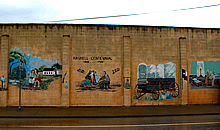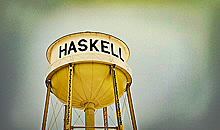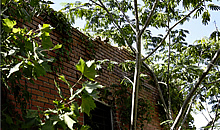Main Menu
Haskell County Data
Haskell County Communities & Places
Genealogy & History Links by USGHN
Important Haskell County Addresses
Sponsors
Haskell County Neighbors
Baylor County, Texas Genealogy & History Network
Jones County, Texas
King County, Texas
Knox County, Texas Genealogy & History Network
Shackelford County, Texas
Stonewall County, Texas Genealogy & History Network
Throckmorton County, Texas
Other Websites
Welcome to Haskell County Texas Genealogy & History Network!
Welcome to the Haskell County, Texas Genealogy & History Network. Our purpose is to provide visitors with free resources for genealogical and historical research. To share your genealogy or history information, send an email to txghn@outlook.com and we will happily include it here. For other Texas Counties, visit the Texas Genealogy & History Network state website and go to the appropriate county. Thanks for visiting and good luck with your research! |
|
About Haskell County, Texas...

Haskell County, in the Rolling Plains region of northwest Texas, is about fifty miles north of Abilene. The county was named for Charles R. Haskell, who was killed in the Goliad Massacre.
Artifacts of nomadic Indian groups have been found in numerous burial sites in Haskell County. Plains Apaches and, after 1700, Comanches, Kiowas, and Kickapoos, established camping places at various springs in the area. Francisco Vásquez de Coronado and a few other adventurous Spaniards are thought to have crossed the area; some of these explorers reportedly sought mineral wealth in small copper deposits along tributaries of the Brazos River. In 1849 a large company of gold-seekers heading for California set out from Dallas. The party camped near a tributary that they named California Creek in the southeastern part of what is now Haskell County.
In 1858 the Texas legislature formed Haskell County from lands formerly assigned to Milam and Fannin  counties. Because of Indian hostility in the area, however, the county remained unsettled for nearly two decades. By 1876 the Indian menace had subsided, and the county was re-established. Ranchers began moving into the area in 1877, when George T. Reynolds and John A. Matthews established their ranch headquarters on California Creek. In 1879 Thomas F. Tucker, remembering the description of the area written by his brother Dick, settled near the Matthews ranchhouse and began his own cattle operation.
counties. Because of Indian hostility in the area, however, the county remained unsettled for nearly two decades. By 1876 the Indian menace had subsided, and the county was re-established. Ranchers began moving into the area in 1877, when George T. Reynolds and John A. Matthews established their ranch headquarters on California Creek. In 1879 Thomas F. Tucker, remembering the description of the area written by his brother Dick, settled near the Matthews ranchhouse and began his own cattle operation.
By the fall of 1882 the ranching community of Rice Springs had begun to flourish, and in December its name was changed to Haskell. Haskell County was organized in January 1885, with Haskell designated as the seat of government; Tom Tucker was elected the first county judge. A small, two-story frame structure served as the first courthouse until a larger, native-stone building was completed in 1891. By 1890 ranching was the mainstay of the local economy, but crop farming was also beginning to become important.
The farming sector suffered severely during the Great Depression and Dust Bowl years of the 1930s. Almost 100,000 acres of cotton land fell out of production, and by 1940 the county had lost 441 farms, or almost 19 percent of the total ten years earlier. Though the first oil wells in the county were drilled and spudded in 1929, extensive production did not begin until after World War II. Subsequently, however, the petroleum industry became important in the local economy. By January 1991, 106,357,516 barrels of crude had been extracted from Haskell County land since discovery in 1929.
Haskell, the county seat and largest town, remains a farm trading center and maintains the county hospital. Lake Stamford, created in 1951 when a dam was built on Paint Creek, provides recreation for local residents and visitors. Haskell hosts the Frontier Days Celebration and Rodeo in May, and the town also maintains the Haskell County Railroad Museum..
 The county has a total area of 910 square miles, of which 903 square miles is land and 7 square miles (0.8%) is water. The population recorded in the 1880 Federal Census was 48. It peaked in 1930 at 16,669. The 2010 census recorded 5,889 residents in the county.
The county has a total area of 910 square miles, of which 903 square miles is land and 7 square miles (0.8%) is water. The population recorded in the 1880 Federal Census was 48. It peaked in 1930 at 16,669. The 2010 census recorded 5,889 residents in the county.
Neighboring counties are Knox County (north), Throckmorton County (east), Shackelford County (southeast), Jones County (south), Stonewall County (west), Baylor County (northeast), and King County (northwest). The county seat is Haskell. Other communities in the county include Irby, Jud, O'Brien, Paint Creek, Rochester, Rule, Sagerton, Stamford, and Weinert.
Haskell County, Texas Records
Birth Records - The Texas Department of State Health Services has records from 1903 to present. Records for the last 75 years considered private and will only be provided to certain individuals. To obtain current information on who may obtain a record, how to submit a request and an official request form, see the Texas Department of State Health Services website or write to Texas Vital Records, Department of State Health Services, P.O. Box 12040, Austin, TX 78711-2040.
For older birth records you will have to write to the County Clerk of the applicable county. The existence of birth records prior to 1903 will vary widely from county to county. Local historical societies and genealogy collections in local libraries may be able to provide some information.
Death Records - The Texas Department of State Health Services has records from 1903 to present. Records for the last 25 years considered private and will only be provided to certain individuals. To obtain current information on who may obtain a record, how to submit a request and an official request form, see the Texas Department of State Health Services website or write to Texas Vital Records, Department of State Health Services, P.O. Box 12040, Austin, TX 78711-2040.
Marriage Records - The Texas Department of State Health Services can provide a verification letter of marriage for Texas marriages from 1966 to present. This is NOT a marriage license. To obtain a certified copy of a marriage license you must contact the County or District Clerk in the county or district where the marriage took place.
Local historical societies and genealogy collections in local libraries may be able to provide some information.
Divorce Records - The Texas Department of State Health Services can provide a verification letter of divorce for Texas divorces from 1968 to present. This is NOT a copy of the divorce decree. To obtain a certified copy of a copy of the divorce decree you must contact the County or District Clerk in the county or district where the divorce took place.
Local historical societies and genealogy collections in local libraries may be able to provide some information.




